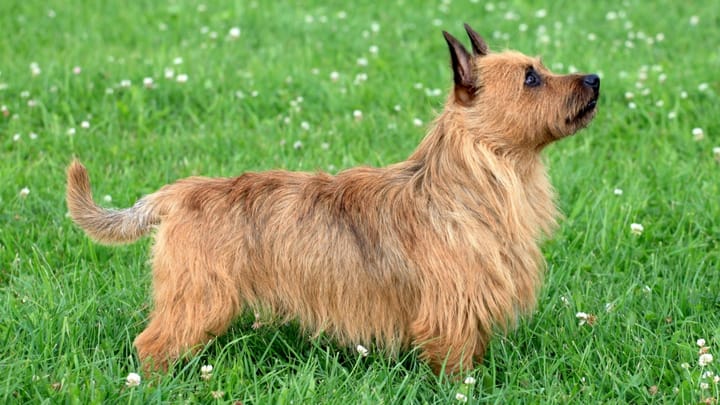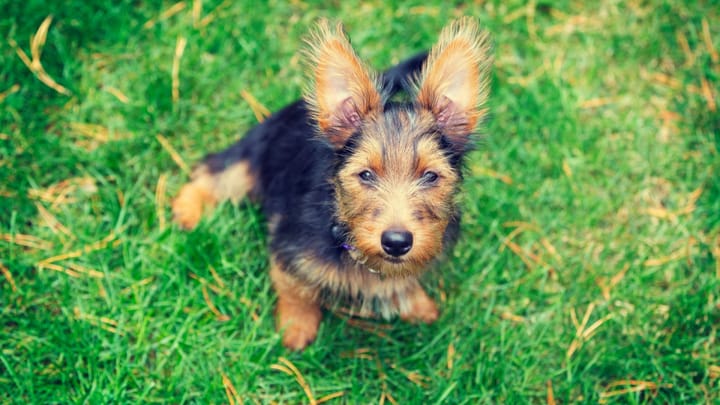Australian Terrier


Looking for a lively and cheerful companion who is energetic enough to join you on long walks, yet small and affectionate enough to cuddle up in your lap? Meet the Australian Terrier! This working Terrier breed is a small dog with bags of personality, known to be intelligent, alert, active and playful. Famed for being truly in tune with its owners, this breed is a great choice for families with children, active couples, and elderly owners alike.
|
Life expectancy |
The Australian Terrier has a life expectancy of between 12 and 14 years |
|
Temperament |
|
|
Size |
Small
|
|
Adult size |
Female
Between 9 and 10 in
Male
Between 9 and 10 in
|
|
Adult weight |
Female
Between 51 and 55 lb
Male
Between 51 and 55 lb
|
|
Coat colour
The coat can be sandy, red, or blue and tan. |
Blue Red |
|
Type of coat
The coat is mid-length. |
Long |
|
Eye colour
The eyes are dark brown in colour. |
Brown
|
|
Purchase price |
The Australian Terrier costs between £250 and £500 |
Despite its name, the Australian Terrier’s ancestral roots are actually British!
More details about the Australian Terrier
Australian Terrier: Origins and history
Way back in the early 19th century, travellers from the UK travelled to Australia, bringing along their rough-coated terrier dogs for protection against disease-ridden rodents and snakes. Once there, the dogs bred with other Terrier breeds, including the Cairn, Skye, Dandie Dinmont, Irish and Yorkshire, which eventually resulted in the Australian Terrier which we know today.
Physical characteristics of the Australian Terrier
The Australian Terrier is a small yet robust dog with a typical Terrier appearance. The body is low-set, with short but sturdy legs and a deep chest. The head is long, with a short muzzle, a black nose, pointy, erect, triangular ears and expressive eyes. Its rustic appearance is typified in his shaggy stylings, with a well-defined collar that reaches to the sternum. This is a scamp you can’t help but fall for!
FCI classification of the Australian Terrier
-
Group 3 - Terriers
-
Section 2 : Small sized Terriers
Australian Terrier: Characteristics
Australian Terrier: Behaviour
Training a Australian Terrier
While independent and sometimes stubborn, the Australian Terrier is clever and highly trainable. The key with this breed is confidence. Be firm but fair and establish yourself as the leader from the start. With patience, consistency, a positive approach, and plenty of rewards, you’ll end up with an obedient friend. Because of the Aussie’s strong prey-drive, early socialization is particularly important.
Australian Terrier: Lifestyle
Breed compatibility Australian Terrier
Australian Terrier: Purchase price
Purchasing an Australian Terrier will cost you between £250 for Non-KC Registered dogs, and £500 for KC-Registered dogs. Looking after a dog of this size typically costs between £60 to £90 a month, including food, medical/insurance, and incidental expenses.
Australian Terrier: Shedding
Average
The Australian Terrier is a moderate shedder.
Australian Terrier: Grooming
Thankfully, the Australian Terrier is fairly low-maintenance in terms of grooming. As a low shedder, all that’s required is a brush over a couple of times per week to remove debris and prevent tangles. Bathe this breed only when it’s absolutely necessary. Remember to clean the ears bi-weekly, trim the nails as needed and brush the teeth daily.
Australian Terrier: Health
This is generally a hardy and healthy dog, with a few minor health concerns to be aware of. The average life expectancy for this breed is 13 years.
Despite its small size, the Aussie Terrier is known to be a hardy breed.
Bred to work in the Australian heat, the Aussie is impressively tolerant of hot weather. However, remember to provide cold water and shade at all times to prevent heatstroke.
Despite being a small dog, the Aussie Terrier, with its rough coat, does tolerate the cold rather well. However, it’s by no means an outside dog and should always have a warm place to shelter.
As a small breed, the Aussie can be prone to weight gain in his senior years. Make sure to provide adequate exercise and avoid letting it overindulge on treats.






